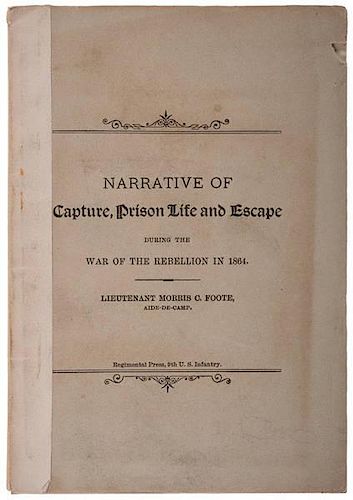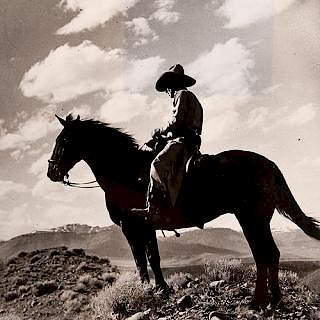M.C. Foote, Rare Narrative Regarding his Civil War Experiences
About Seller
6270 Este Ave.
Cincinnati , OH 45232
United States
With offices in Cincinnati, Cleveland and Denver, Cowan’s holds over 40 auctions each year, with annual sales exceeding $16M. We reach buyers around the globe, and take pride in our reputation for integrity, customer service and great results. A full-service house, Cowan’s Auctions specializes in Am...Read more
Two ways to bid:
- Leave a max absentee bid and the platform will bid on your behalf up to your maximum bid during the live auction.
- Bid live during the auction and your bids will be submitted real-time to the auctioneer.
Bid Increments
| Price | Bid Increment |
|---|---|
| $0 | $25 |
| $500 | $50 |
| $1,000 | $100 |
| $2,000 | $250 |
| $5,000 | $500 |
| $10,000 | $1,000 |
| $20,000 | $2,500 |
| $50,000 | $5,000 |
| $100,000 | $10,000 |
About Auction
Jun 12, 2015 - Jun 13, 2015
Cowan's Auctions dawnie@cowans.com
- Lot Description
Morris C. Foote. Narrative of Capture, Prison Life and Escape During The War Of The Rebellion In 1864 [by] Lieutenant Morris C. Foote, Aide-De-Camp. Regimental Press, 9th US Infantry. n.d. 35pp. Wraps. Research indicates that only 12 copies of this book were printed, making this an exceptionally rare example.
The Morris Cooper Foote Collection
Lots 140-152
Cowan’s is pleased to offer an important collection spanning 40 years of material—40 years of the life of the soldier Morris Cooper Foote, great grandson of Lewis Morris—a signer of the Declaration of Independence—and great nephew of novelist James Fenimore Cooper.
When the Civil War began, Foote joined the army at the age of 17 in his home state of New York, where he mustered into the 44th NY Volunteers, a group that came to be known as Ellsworth’s Avengers. After a promotion to 2nd Lieutenant and a transfer to the 92nd New York Volunteer Infantry, Foote was captured by the Confederate Army at the Battle of Plymouth in 1864 and was sent to Libby Prison. Eventually, Foote and many other POWs were sent to Charleston, S.C. where both Confederate and Federal forces attempted to use prisoners as human shields to discourage shelling—an incident now known as the “Immortal 600.” As one of the Federal officers placed under the fire of the northern batteries at Charleston, S.C., he was the only one wounded. From Charleston, Foote was transferred to Camp Sorghum in Columbia, South Carolina, where he escaped. He later published the story of his escape and loved to share it with family and friends. In the concluding stages of the war, he served as a staff officer at the surrender of Lee’s army at Appomattox.
After the Civil War, Foote entered the 9th U.S. Infantry on May 1866, and on March 7, 1867, received a promotion to the first lieutenancy. He served with his regiment in California, Alaska, Nevada, Arizona, New Mexico, Colorado, Wyoming and Nebraska. In Alaska, he commanded one of the two companies that received the territory from Russia in 1867. Foote also served in Native American campaigns and expeditions under Generals Miles and Crook, in Wyoming, New Mexico and Arizona. As part of Foote’s time in Wyoming, he took part in the exploration of The Black Hills a year before the events of Little Big Horn. He also conducted the first census of the Sioux Indians after the 1876 treaty as part of his duties as the commanding officer at the Spotted Tail Agency. After the discovery of gold in the Black Hills—an event that caused controversy between miners and Indians and eventually lead to tragedy—Foote attended a meeting of miners who, deciding to leave the area as requested after hearing a resolution from the President of the United States, went on to create Custer City (present day Custer), South Dakota, now considered to be the oldest town established by European Americans in the Black Hills. On January 26, 1883, Foote achieved the rank of captain of the 9th infantry. In September 1886, he witnessed the surrender of the Apache chief Geronimo to General Miles at Skeleton Canyon, Arizona.
Following the end of the Indian Wars, Foote’s regiment participated in the Spanish-American War. Foote commanded a battalion at the battle of San Juan Hill. At the formal surrender of Santiago, the commanding officer General Shafter selected the 9th infantry to receive the surrender of the city and province where Foote commanded a company stationed in the plaza. In August 1898, Foote received promotion to the rank of Major and orders to Boston on recruiting service, being unable to rejoin his regiment at the time due to suffering from Cuban malarial fever.
At the beginning of the twentieth century, the U.S. Army dispatched the 9th Infantry Regiment to China during the Boxer Rebellion and the China Relief Expedition, where Maj. Foote took part in the Battle of Tientsin.
After being appointed a Brigadier General on February 18, 1903, Foote retired the following day. Foote retired to Europe and resided in Geneva for two years. At the Hotel d’Angleterre, after recovering from double pneumonia and double pleurisy he passed away of heart failure on December 6, 1905.
As a soldier and an officer, Morris Cooper Foote experienced first-hand the moments that shaped our history and set the stage for the 20th century. This exceptional collection includes diaries, journals, letters, documents, books, photos, maps, prints, personal belongings, and more pertaining to his professional and personal life.Very good condition. [copy 2 – repair along the spine, small chip to wrap. A few manuscript editing notations.]Condition
- Shipping Info
-
SHIPPING. At the request of the buyer, Cowan's will authorize the shipment of purchased items. Shipments usually occur within two weeks after payment has been received. Shipment is generally made via UPS Ground service. Unless buyer gives special instructions, the shipping method shall be at the sole discretion of Cowan's Auctions, Inc.. Cowan's is in no way responsible for the acts or omissions of independent handlers, packers or shippers of purchased items or for any loss, damage or delay from the packing or shipping of any property.
-
- Buyer's Premium



 EUR
EUR CAD
CAD AUD
AUD GBP
GBP MXN
MXN HKD
HKD CNY
CNY MYR
MYR SEK
SEK SGD
SGD CHF
CHF THB
THB











